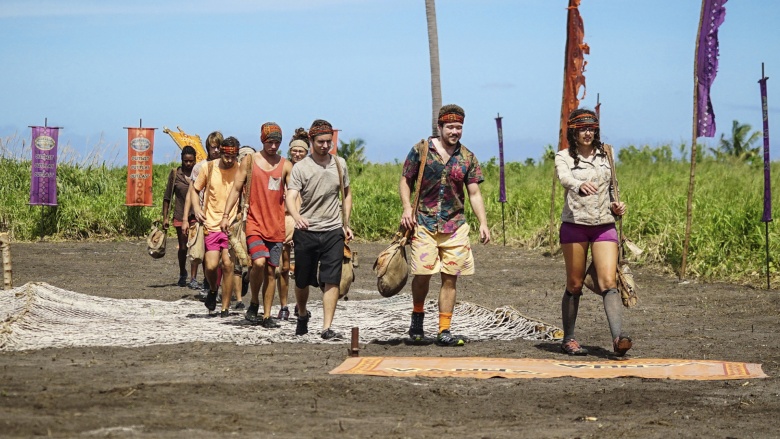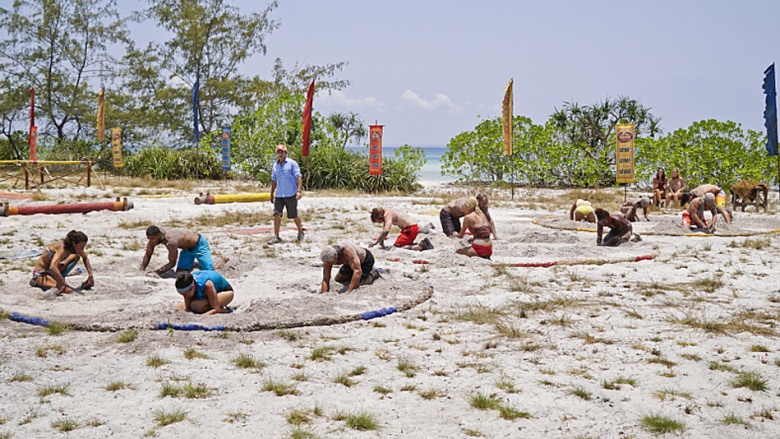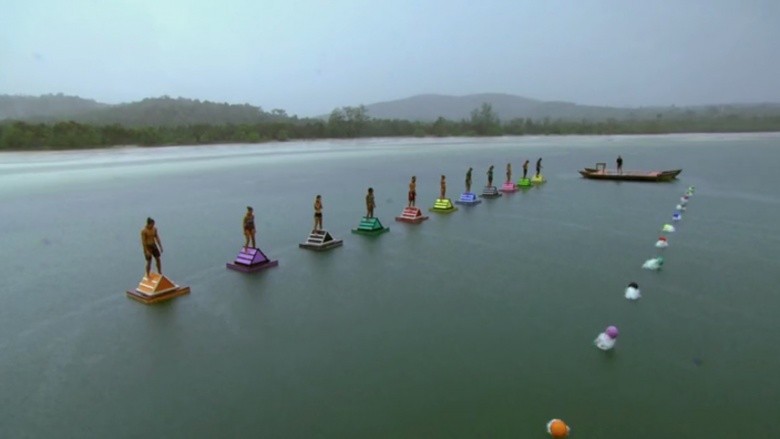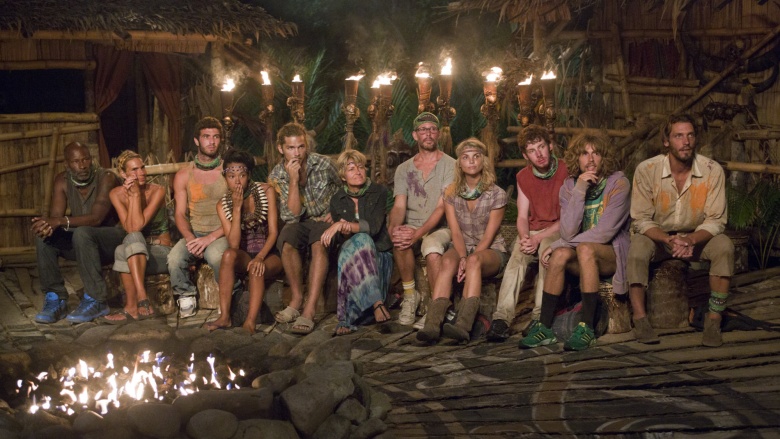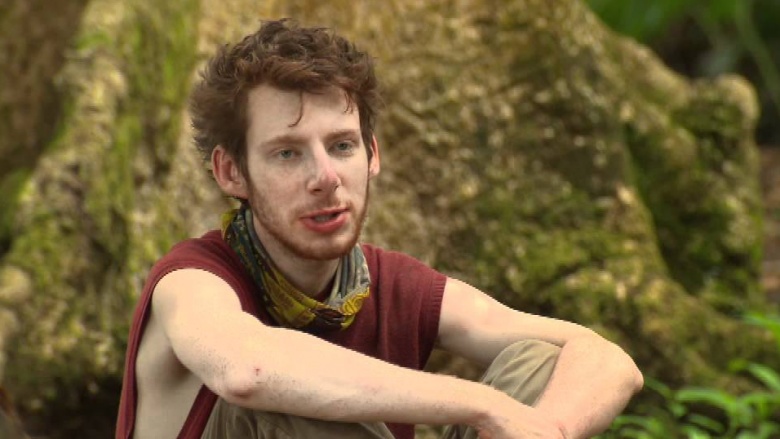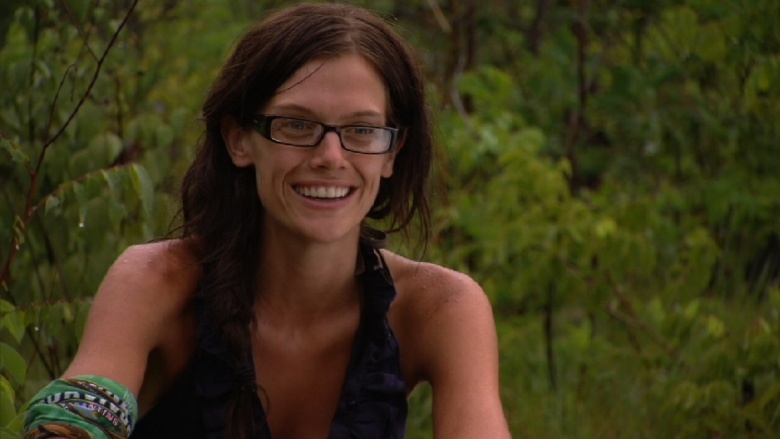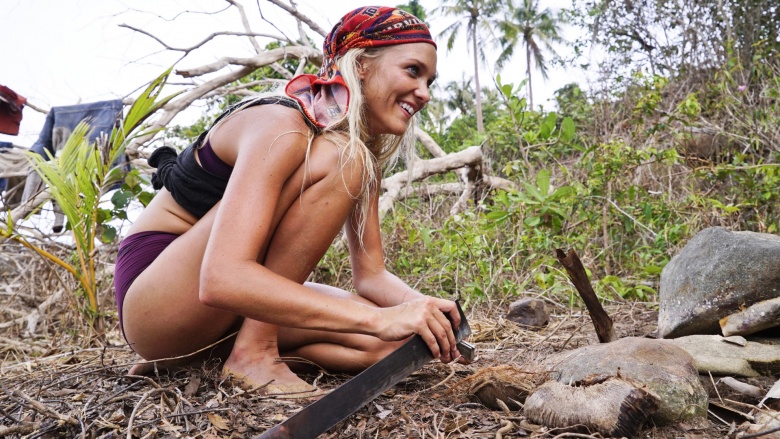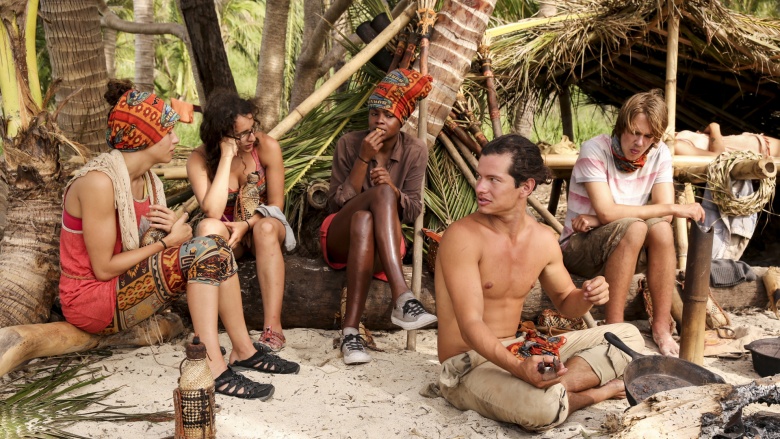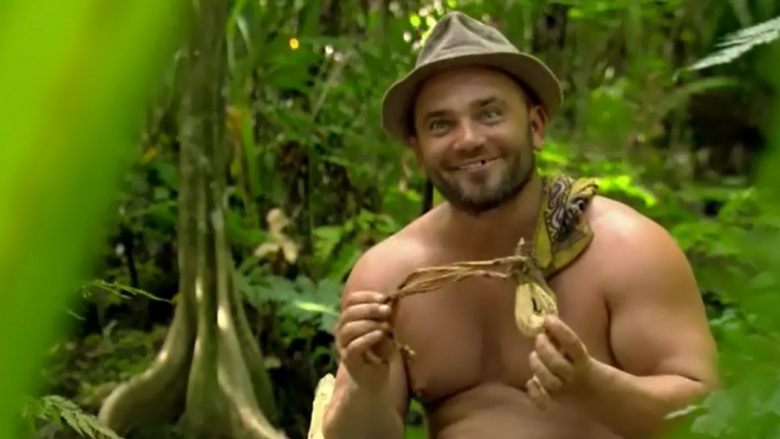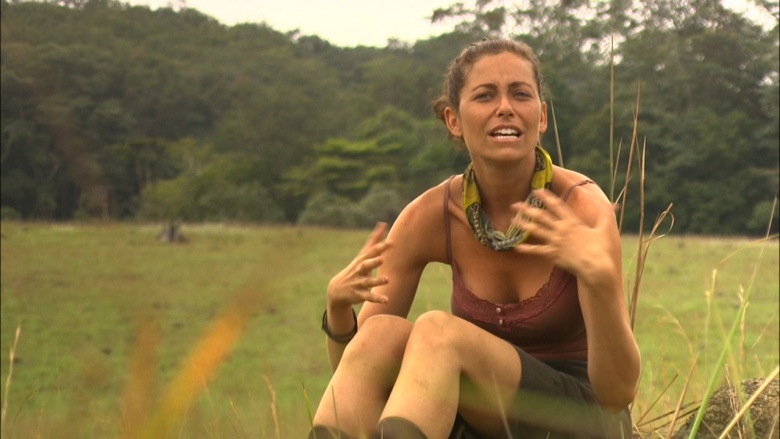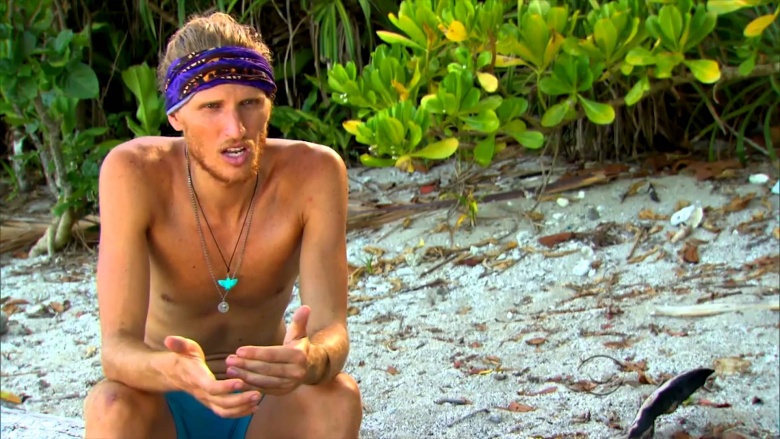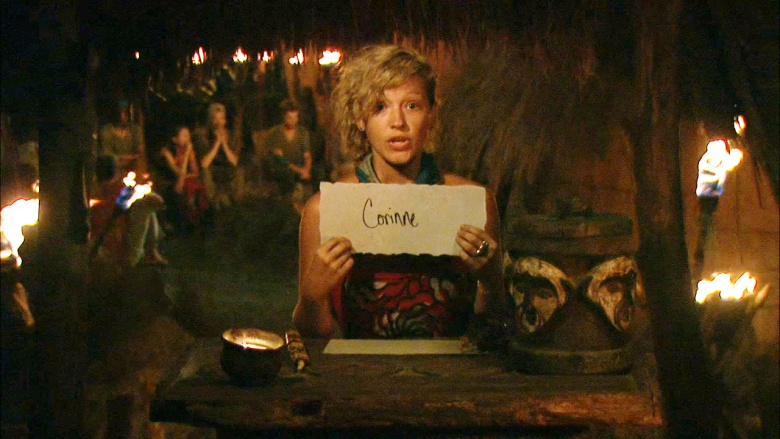Proof That Survivor Is Totally Fake
Survivor is the OG reality competition show, the one that started a movement that would change the television landscape forever. The series, which strands contestants in the wild while they compete for a $1 million prize, puts its players through starvation, terrible climates, sleepless nights, and more, making it one of the most difficult reality shows around.
However, there are elements of Survivor that aren't as genuine as they seem on TV. While contestants really do live in the wild and largely have to fend for themselves, this is still a television show, which means the folks who make it have to keep contestants safe while creating a good story for audiences. Aside from the typical manipulative questions and editing that goes into any reality series, here are the other elements of Survivor that aren't as real as they may seem.
Contestants don't walk to challenges and tribal councils
Anyone who's watched Survivor has seen the shots of contestants walking up to a challenge or tribal council with walking sticks and packs. According to MSNBC (via the Today show), contestants don't actually traipse on foot from place to place. Instead, they are supposedly chauffeured via vehicles and then kept in a waiting area until it's time to go out and film. This makes sense logistically. For contestants to walk from place to place could take hours and make it difficult to manage the time constraints of filming, and the audience is not missing much by not seeing the contestants driving to and from because the competitors are reportedly not allowed to speak during these times. This means that, even though a good amount of time may have passed between a challenge or tribal council and the dramatic explosion that occurs when contestants get back to camp, participants have spent it all simmering instead of working out their issues off camera.
Competitors have lots of prep time before challenges
Before each televised challenge, host Jeff Probst gives a brief explanation of the event, and then contestants appear to dive right into the competition. However, there's actually much more that competitors have to do before they begin the challenge. After the filmed TV instructions, Probst and the crew reportedly walk each tribe through the event in detail to show them exactly how it will go down. "The tribes can ask questions or strategize during that time," reported MSNBC (via the Today show). "Accompanying them is someone from CBS' standards and practices division, who makes sure that each tribe has the same basic information so that the contest remains fair."
The aerial shots aren't real
On TV, audiences frequently see cool aerial shots of the contestants walking into a challenge before the camera shifts to footage from the ground, but guess what? Those people viewed form above aren't even the competitors.
In every challenge, there are dozens of crew members milling around, filming, watching, waiting in case someone needs medical attention. If the birds-eye shots were done when the actual contestants were walking into the event, we would see all the crew members on the beach instead of just the contestants. Instead, the aerial filming is done before the real contestants walk in using a group of crew members known as the "Dream Team." Reportedly comprised of young, athletic crew members, the team runs through challenges before contestants play them to make sure they're doable and fair.
Executive producer Mark Burnett confirmed that the show employs body doubles for certain scenes but told the Daily Mail he "couldn't care less" about the fact that this practice makes the show less realistic. "I'm making great television," he said.
The tribal council is heavily edited
In the televised episodes, the typical tribal council appears to lasts 10 minutes or less, but in real life, tribal councils usually last for at least an hour and include a long list of questions from Probst on a wide variety of topics, according to former contestants and a show cameraman who participated in Reddit discussions. The insiders explained that when tribal councils occur, producers are not yet sure which storylines will be highlighted during the editing process, so it's critical Probst covers a wide range of issues to provide maximum material for potential use. Apparently, much of the tribal council ends up being boring and irrelevant, so all that dull footage gets tossed before the episode airs. Oh, and one more thing, even the constants' walk to the tribal council is sometimes filmed more than once to ensure the shot is dramatic enough, the former cameraman said.
Producers decide what cast members wear
Winner John Cochran's sweater vest from his first appearance on Survivor has become iconic, but the self-admitted nerd said he never actually wore sweater vests before being cast on the show. "The lady on the phone said, 'Justin Timberlake wears sweater vests,'" he reportedly told students at Northwestern University (via RealityBlurred.com).
Contestant Candice Woodcock confirmed the wardrobe rumors in a separate interview with the site. "They pretty much choose what they want you to wear," she said. "If you don't send them what they want, they make you go out and get it. Last night, they went out and bought a bathing suit for me after they'd already approved my other one. I was like 'Really, seriously, guys?' I had to try it on and they thought it looked fine, so I doubt that you can refuse that. There was one of them that I thought was hideous, so I was like, burn that."
It's allegedly written into the contestants' contracts that the show can decide what they wear. This helps the series match contestants' clothing to the color of the tribe they are in and to coordinate their outfits for the type of role they want them to play on the show. Cochran claimed he was intentionally styled to be a nerd, and Woodcock said the crew wanted her to appear more athletic, so she was ordered to wear a sports bra.
Producers allegedly help contestants get food or fire
Past contestants have dished that there were times when producers helped them get some much-needed food or fire. Contestant Erinn Lobdell told RealityBlurred.com that while she competed on Exile Island in Survivor: Tocantins, a camera operator lit a fire for her with a lighter. Kelly Goldsmith of Survivor: Africa told the site her tribe was given matches, while Mookie Lee of Survivor: Fiji revealed that a fire apparently lit by a pair of glasses on TV was actually ignited by a lighter.
They may not have to boil the water
Contestants in the early episodes of the show are always shown struggling to get fire for their tribe so they can boil and drink the water provided for them in the well near their camp. Contestants are often shown complaining about thirst, and tribes routinely appear to fall apart over the quest for safe H2O. However, according to a Survivor cameraman's Reddit interview, the water in the well is actually potable and poured directly into the well from a water cooler jug. While there may be some dirt and bugs that get into the supply, the cameraman suggested the water is probably safe to drink without being boiled, thus eliminating the immediate need for fire.
Contestants receive survival coaching
Yes, Survivor contestants do have to hunt, fish, and find their own food in the wild. Contrary to popular believe, they supposedly aren't given any grub off camera, but they also aren't left completely on their own, as the show implies. According to a Reddit interview with a former cameraman on the show, contestants are given a book upon their arrival on the island with helpful information such as what plants can be eaten, what the native animal and fish species are, and tips for good hygiene. However, the cameraman also said most contestants never even open that book, so when they're unable to find food, that may very well be their own fault.
Camera crews provide clues
The camera crews are all knowing, meaning they know when to follow contestants for a secret meeting or when competitors are headed in the direction of an immunity idol. This can have an effect on the game. "If two crews (six people) leave and follow one or two people, it does get noticed," a cameraman said in a Reddit interview. "The smart ones will get away one at a time and rendezvous. Rarely do we miss those events. It is up to them to be stealthy. The more savvy ones will tip us off that they are having a meeting, and ensure they have a smooth cover."
Jury speeches are rehearsed.
The speeches jurors give at the final tribal council range from boring and predictable to explosive and shocking, depending on how bitter the juror is feeling about his or her exile. According to former contestant Corinne Kaplan's Reddit interview, juror's speeches are written beforehand and rehearsed for producers to gain clearance. "When I had my turn to tell them my speech they freaked out," she said. "Jeff [Probst] smiled and said 'Corinne please don't change a single word of that.' And I didn't. I had it memorized."
Most of the contestants don't apply to be on the show.
While some contestants are Survivor super fans, others have never even seen or heard of the show before signing up. According to MSNBC (via the Today show), casting directors have admitted that while they usually receive tens of thousands of applications, most are from people who wouldn't be a good fit to actually appear on the show. Consequently, the series reportedly recruits models or actors to go through the casting process as well, and many end up landing roles on the show. Survivor: Fiji supposedly included only one contestant who was not recruited. That process may seem shady, but it has does produce popular contestants, including Yau-Man Chan, Jonny Fairplay, Yul Kwon, and Tyson Apostol.
The results may be rigged
Rigging claims hit every reality show, with bitter ex-contestants claiming producers had a hand in getting them voted off. Sometimes, the claims hold water; other times, they are debunked quickly by a network's legal team. Survivor contestant Stacey Stillman has been vocal about her allegations that the show is rigged, claiming she was voted off the first season at the behest of producer Burnett, who wanted to keep 72-year-old Rudy Boesch on the show in order to appeal to the over-40 demographic. Fellow contestant Dirk Been supported Stillman's claims, saying producers were "dropping hints" about who to vote for, according to the Los Angeles Time. CBS denied Stillman's lawsuit, which called for restitution for lost prize money and $75,000 for punitive damages. The case was eventually settled out of court.


